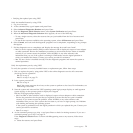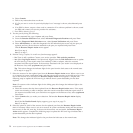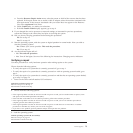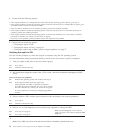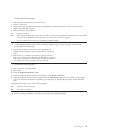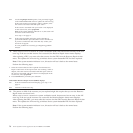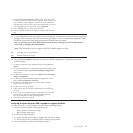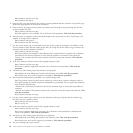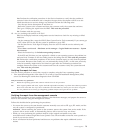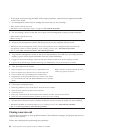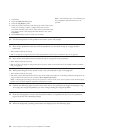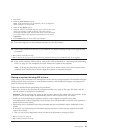
Yes: Perform the verification procedures in the Service functions to verify that the problem is
corrected. After the verification test is complete, the tape device description will be set to the
failed state because a resource change was detected. Perform the following tasks:
- Vary the tape device description off and then on.
- Return the system to the customer and have the customer verify the system date and time.
Then go to Verifying the repair from the HMC. This ends the procedure.
No: Continue with the next step.
15. Are you working with an IOP or an IOA?
Yes: Use the display hardware configuration service function to check for any missing or failed
hardware:
- On the command line, enter the STRSST (Start System Service Tools command). If you cannot get
to SST, select DST. Do not IPL the system or partition to get to DST.
- On the Start Service Tools Sign On display, enter the user ID with the service authority and
password.
- Select Start a service tool → Hardware service manager → Logical hardware resources → System
bus resources.
- Select the function key for Include nonreporting resources.
- If the IOP and IOA that you just replaced is a failed or non-reporting resource, the problem has
not been fixed. Continue to the next failing item in the failing item list. This ends the procedure.
No: Perform the verification procedures in the Service functions topics to verify that the problem
is corrected. Resources that usually vary on automatically during an IPL, or that were previously
varied on manually, might need to be varied on again after the verification procedures are
complete. Return the system to the customer and have the customer verify the system date and
time. This ends the procedure.
Verifying the repair in Linux
You can use this procedure to verify that a repair is complete using the Linux operating system.
1. Run stand-alone diagnostics from either a CD or from a Network Installation Management (NIM)
server. See Running the stand-alone diagnostics from CD-ROM.
Did you encounter any problems?
No Reboot the operating system and continue with the close of call procedure.
Yes If the original problem still exists, replace the field-replaceable unit (FRU) or perform the isolation procedure
that is next in the FRU list. If you have reached the end of the FRU list, contact your next level of support.
If a new problem has occurred, go to Beginning problem analysis and repair the new problem.
Verifying the repair from the management console
Perform these procedures to close problem numbers, clear hardware messages, and prepare the server to
return to the customer using the management console.
Follow this checklist before performing the procedures:
v You return the server to the state that the customer normally uses such as IPL type, IPL mode, and the
way the system is configured or partitioned.
Attention: Before returning the system to the customer, remove the system from service mode. If the
system is left in service mode, it automatically places a call for service every two hours.
v While you were performing the problem analysis on the original serviceable event, other
serviceable-event numbers might have been opened. Close all serviceable events that were opened as a
result of your service activity.
v Server verification has been performed and there are no problems that require additional service
actions.
Power supplies 79



